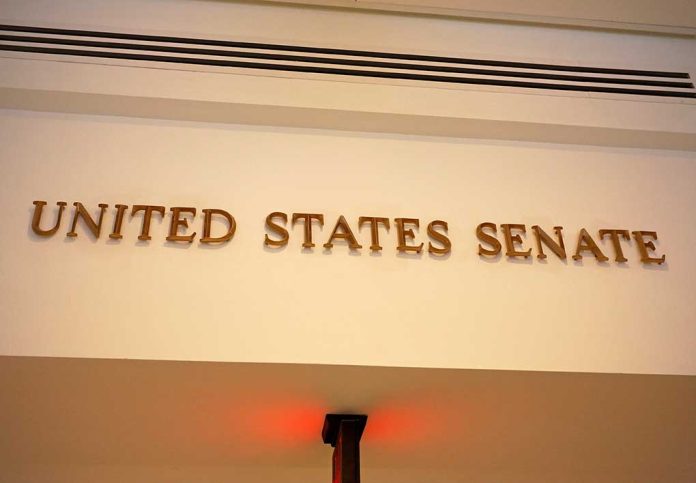
Four Republican senators break ranks with Trump on Canada tariffs, facing presidential backlash and exposing deep party divisions over trade policy.
Key Takeaways
- The Senate approved a measure to block tariffs on Canada with a 51 to 48 vote, with four Republican senators joining Democrats.
- Republican Senators Susan Collins, Rand Paul, Lisa Murkowski, and Mitch McConnell have drawn Trump’s ire for supporting the resolution.
- Trump accused the defecting senators of “playing with the lives of the American people” and having “Trump Derangement Syndrome.”
- The resolution is largely symbolic as House Republican leadership won’t take it up, and Trump has vowed to veto it if necessary.
- The debate highlights significant Republican Party divisions over trade policy and presidential emergency powers.
Senate Votes to Block Canada Tariffs as Republicans Split
The U.S. Senate approved a measure to block President Trump’s tariffs on Canadian goods with a narrow 51-48 vote. Four Republican senators – Mitch McConnell, Susan Collins, Lisa Murkowski, and Rand Paul – crossed party lines to support the Democratic-led resolution. The measure, spearheaded by Democratic Senator Tim Kaine of Virginia, aims to terminate the national emergency declaration that Trump used as justification for imposing the tariffs. Despite this Senate action, the resolution faces little chance of implementation as House Republican leadership has indicated they will not consider it, and Trump has promised a veto if it reaches his desk.
The resolution challenges Trump’s assertion that the tariffs are necessary to enhance border security and stop the flow of fentanyl from Canada. Senate Majority Leader John Thune and other Republican leadership firmly opposed the measure, emphasizing the importance of addressing security threats at the northern border. Democratic Senate Minority Leader Chuck Schumer framed the tariffs as “a tax increase on American families” and urged all Republicans to support the resolution, creating a clear partisan divide with notable Republican exceptions.
51-48: The Senate passes a resolution to block Trump's tariffs on Canada.
4 Republicans joined Democrats in voting yes:
• Susan Collins
• Mitch McConnell
• Lisa Murkowski
• Rand PaulThe measure is not expected to get a vote in the House. pic.twitter.com/gHtQaU6Tti
— The Recount (@therecount) April 2, 2025
Trump’s Sharp Rebuke of Republican Defectors
President Trump did not mince words in his response to the four Republican senators who sided with Democrats. In a scathing post on Truth Social, he accused them of disloyalty and suffering from “Trump Derangement Syndrome.” The criticism came as Trump prepares to announce “reciprocal tariffs” and potentially additional levies on Mexico and China. His frustration with the Republican defectors was palpable as he warned against giving Democrats a political victory that he claimed “would be devastating for the Republican Party and, far more importantly, for the United States.” “Don’t let the Democrats have a Victory,” the president said in a post on Truth Social Tuesday. Trump went on to say, “It would be devastating for the Republican Party and, far more importantly, for the United States.”
He went further in his critique, suggesting they were “playing with the lives of the American people, and right into the hands of the Radical Left Democrats and Drug Cartels.” The president dismissed the Senate resolution as “just a ploy of the Dems to show and expose the weakness of certain Republicans,” emphasizing that it would ultimately fail due to House opposition and his veto power.
Collins and Paul Stand Firm on Principles Despite Pressure
Despite intense pressure from Trump and Senate Republican leadership, Senators Susan Collins and Rand Paul remained steadfast in their opposition to the Canada tariffs. Collins, representing Maine which shares a border with Canada, has been particularly vocal about her concerns. She argues that imposing tariffs on Canada, which she describes as “our closest neighbor” and a “friendly ally,” would harm both nations’ economies. Her state’s significant economic ties with Canada make the tariff issue especially relevant to her constituents.
Senator Rand Paul’s opposition stems from his longstanding principles regarding executive power. Paul consistently advocates for congressional authority over tariffs and trade policy, rather than allowing such decisions to be made through presidential emergency declarations. He has maintained this position regardless of which party controls the White House, emphasizing the constitutional role of Congress in trade matters. Both senators have histories of occasionally breaking ranks with their party on issues where their principles or state interests differ from the broader Republican stance.
Border Security Debate Fuels Tariff Controversy
The debate over Canada tariffs is fundamentally tied to broader disagreements about border security and drug trafficking. The Trump administration cited increased fentanyl production in Canada as justification for the emergency declaration. Senate Majority Whip John Barrasso emphasized this security dimension during floor debate, noting that Border Patrol had reportedly caught 143 terror suspects at the northern border this year alone. Customs and Border Protection reported seizing nearly 50,000 pounds of fentanyl over the past two fiscal years, though the resolution’s supporters argue the vast majority comes through the southern border with Mexico.
Senator Kaine, who sponsored the resolution, challenged the administration’s justification, calling it a “made up emergency.” He and other Democrats framed the tariffs as harmful to American consumers and businesses rather than effective security measures. The dispute highlights fundamental differences in how lawmakers view the relationship between trade policy and national security, with Republicans generally supporting the president’s broad use of tariffs as leverage and Democrats questioning both the economic impact and the legal basis for such actions.
Sources:
4 Republicans join Senate Democrats to rebuke Trump tariffs on Canada
Trump blasts 4 GOP senators over possibly scrapping Canada tariffs: ‘What is wrong with them’



